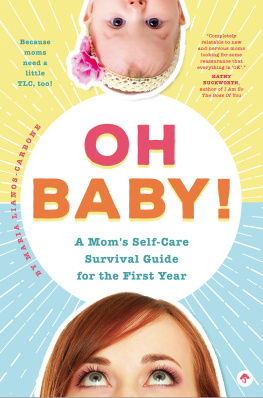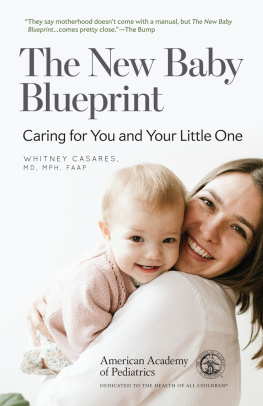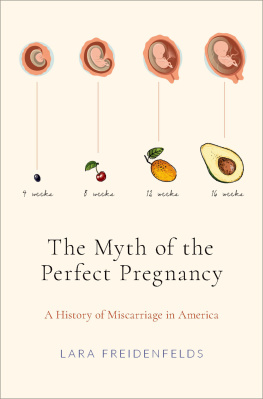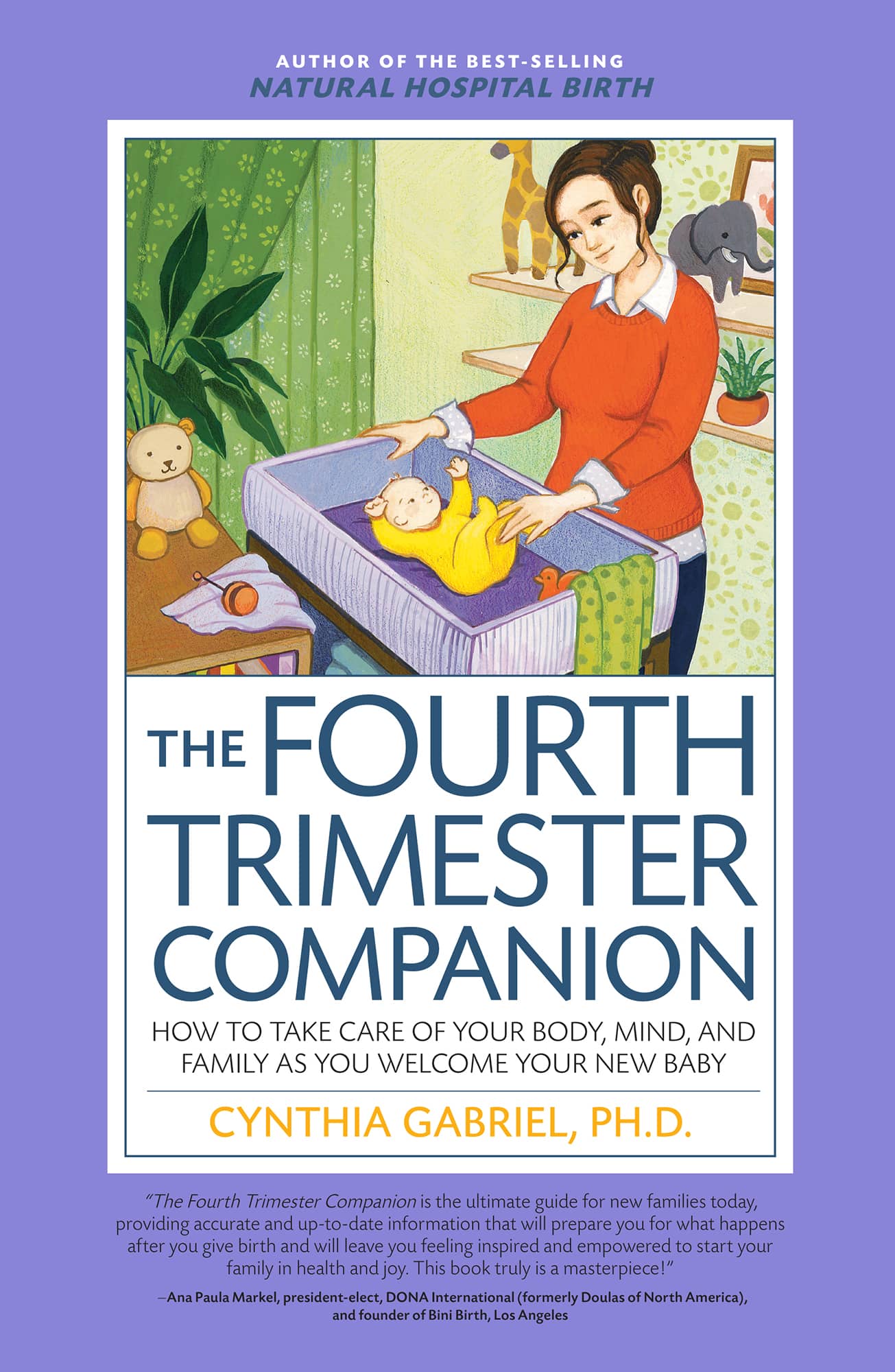
Introduction
T HE FOURTH TRIMESTER IS ONLY THREE MONTHS LONG . In many cultures, intuitive recognition of this special time is built into rituals. New mothers and babies in so many societies are sequestered and cared for in special ways for about forty days. When you are immersed in this time, every day can feel like a year. Simultaneously, when you look back on your first week or your first month with a newborn, you might feel like it happened in a blink. Because it can feel so fast, I think this period is often glossed over in Western culture. A time that deserves much thought and care is, too often, rushed and undervalued.
The fourth trimester term came about as a way to recognize that human babies are born extremely needy. Other mammals are born more fully developed than human babies. Think of how baby horses or elephants are able to walk so soon after birth, for example. Researchers who compared the neurological development of newborn chimpanzees and newborn humans found that human babies would have to remain fetuses for up to eighteen months, or twice as long, to be born with the same relative brain maturity of chimpanzees at birth. Though anthropologists argue over why human babies are born earlier in their development than any other mammal, the fact that human babies are born more helpless is not debated. One theory worth considering during your babys fourth trimester is that human babies need to learn through social interaction more than any other species. That means their need for interaction with you is possibly the reason they are born so early.
I invite you to see the fourth trimester as a special time for you and your family. Think of your little one as needing constant care and human touch for the first three months, as if she were still gestating. It doesnt mean every moment will be blissful, but my experience with hundreds of new mothers indicates that the more mindfully and slowly you return to regular life after having a baby, the more bliss you are able to feel.
The work of mothering, and fathering, is slow-paced and repetitive. As I explain in , parenting challenges can be measured in hours, while joy is usually measured in moments. To be a parent we have to develop the ability to listen carefully, even to small humans who cannot yet speak words. We live with a dichotomous understanding of time as something both infinite and limited. On one hand, we sit with two-year-olds crying about losing their blanket as if this is truly the most momentous calamity; on the other, we are well aware of work deadlines blinking on our computer calendars.
This book is designed to help you stop and pay attentionin the moment. I wanted to write a book that focused on the experience of the birthing mother as she recovers and changes in the immediate postpartum period and learns how to be a parent. Many books focus exclusively on baby care and development, when, in reality, parents also experience a life transition. You are becoming a new person when you add or expand the role of mother.
Most of this book appears as a rational guide to self-care and baby care in the fourth trimester. However, I hope that underneath the advice and tips sprinkled throughout these pages, you also glimpse the veneration and appreciation I hold for the work you are doing. I have spent a great deal of my professional life in the presence of babies being born. By nature, I am a rational thinker; by professional experience, I have become a mystic. I find the experience of witnessing childbirth to be transcendental and numinous.
As a new mother, when I encountered someone who really understood what I was going through, I felt seen. Until those moments, I did not even know I had felt invisible. But, for much of my parenting life, I, like so many others, have indeed felt invisible. I am grateful for all those who held me up as a mother, helped me develop skills, and gave me permission to enjoy this time in the cycle of life.
By consciously gathering the wisdom of those who have gone before me or who have walked next to me into this book, I hope to contribute to your sense of self-respect and confidence in parenting. What you are doing in this sphere is equally worthy of discussion, study, and being shared as any other part of your life. I want to live in a society in which the reproductive and productive work we do are equally valued. When both sides of this equation are balanced, I think we all feel better and treat each other with more kindness and respect than we do when one side is more esteemed than another.
I also wish to impart the immense value of being supported in your parenting efforts. Unfortunately, it is possible to parent in a virtual vacuum, just taking care of your children the best you can without much input from anyone else. I fear that this is the default mode of Western parenting.
I accidentally discovered how wonderful it is to feel supported in parenting when one of my children was diagnosed with autism. When my neurotypical children were between two and five years old, my husband and I were, basically, on our own to muddle through parenting dilemmas. Our own parents lived far away. We frequently moved to new cities for our work. I survived by communing with other mothers of young children. (Heres looking at you Tracey Reid, Lavetta Griffin, Alex Vamos, and Jennifer Woodill!)
By contrast, when my child on the autism spectrum was between two and five years old, I had an army of experts whom I could consult for advice and support. I benefitted from professionals who came into my house, observed how I parented, and offered advice. Not everyone welcomes this particular form of support, but, for me, it was positive and life changing. My parenting was visible in a novel way, and I learned to accept support in new ways.
That experience has taught me I can reach out much, much more than I previously believed I could. While some of those professionals are paid, many volunteered their time and expertise. Now, for virtually any parenting challenge I face, I feel empowered to reach out for advice and support. Some stalwart friends are there most of the time; others offer support during a short phase of my life. In turn, I give to new parents where I can. In business, this is called networking. In parenting, it is community. The difference networking can make to your career is huge; the difference community can make to your family life is incalculable.
I wish you a joyous fourth trimester as you care for yourselves and your newborns. Smell their beautiful newborn scent and bask in the way they trust the Universe to care for them. You are their universe for now. You have never been more important.
Writing Notes:
A few notes are warranted to help you understand some of what is written here. I have changed the names of all the mothers and fathers who shared their stories with me, although I maintained the names of their real hometowns. However, with permission, I retained the real names of all the birth professionals who contributed to this book, even if they shared a personal story.
I have alternated the pronouns she and he throughout the book, unless specifically retelling a story of a particular baby girl or boy.











